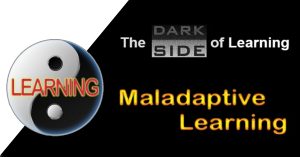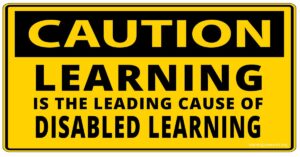We are always learning but not all learning is good for us. Learning can be as unhealthy as it can be healthy. Learning is as responsible for what goes wrong in our lives as it is for what goes right in our lives. Learning has a dark side.
 Generally speaking, unhealthy behaviors result from unhealthy learning.
Generally speaking, unhealthy behaviors result from unhealthy learning.
We can learn our way to the pinnacles of art and science, but we can also learn to believe that killing human beings is a holy thing to do. As children we can learn coping strategies that are healthy and adaptive responses to our immediate emotional needs, but that are unhealthy and maladaptive to our emotional learning later in life. Through learning we can extend into new skills, thoughts, emotions, feelings and sensations; and, also through learning, we can develop pathological aversions to activities, thoughts, emotions, feelings, and sensations that we’ve learned to fear might hurt us (or learned to fear might shame us).
Though we can be born with genetic predispositions toward potentially unhealthy behaviors, for the most part, our actual unhealthy behaviors are learned. Though there are people whose learning, behavioral, or health issues have innate neurobiological causes, for the most part….
- we learn our way into addiction, abuse (self and others), social pathologies, and crime.
- we learn our way into unhealthy lifestyles, relationships, and jobs.
- we learn our way into heart disease and cancer.
- we learn our way into bigotry, racism, fascism, and all our other socially pathological “isms”.
- click for a tour through examples of maladaptive learning
Our unhealthy behaviors spread through our learning like diseases spread through our breathing and touch. We don’t have genes for bigotry, racism, fascism or our other social pathologies, they are all learned.

Acquired Learning Disabilities.
acquired learning disabilities: learned cognitive schema and emotional habits that disable (avoid, misdirect, wrongly bias,…) learning
Just as we can acquire diseases that turn our immune systems against us, we can aquire mental and emotional habits that turn learning against us. We can learn ‘beliefs’ that avoid learning about anything that threatens them (See: Orientation). We can learn unconscious cognitive processes that misorient and misdirect our learning (see: Maladaptive Cognitive Schema). We can learn to avoid the shame of not being good enough at learning (x) by avoiding learning about (x).
All learning involves some degree of confusion. If feelings of confusion trigger feelings of shame, then avoiding the shame leads (most often) to avoiding the confusion. Confusion avoidance is learning disabling.” (see: MIND-SHAME).
Just as the word learning can be used as a noun (what was learned) and a verb (the active process of learning), ‘unhealthy learning’ can also be applied both ways. Not only can what we learn be healthy or unhealthy in terms of behavioral-health outcomes, how we learn can be healthy or unhealthy in terms of what we’re learning in particular as well as how well we learn in general.
Healthy learning (noun) provides the ‘scaffolding’ that enables our learning (verb) to extend into new dimensions and abilities. Healthy learning (noun) integrates deeply, ‘transfers’ well, and resources, supports, and orients healthy learning (verb). Healthy learning is adaptive to the present situation without being maladaptive to learning in future situations.
Unhealthy Learning disables or maladaptively misdirects or undermines our learning. Unhealthy learning (noun) misdirects and misorients our learning (verb). Unhealthy learning can be either cognitive or emotional content or cognitive or emotional habits of participating in learning that undermine or maladaptively skew learning.
Most struggling children are struggling because what they learned in the past is inadequately resourcing or maladaptively directing their current learning. To help children through their learning struggles (at school and in life) we have to be able to recognize and address unhealthy learning.
The most important step toward improving the health of our children’s learning is recognizing, understanding, and minimizing, unhealthy learning.
Learning Stewards is a 501(c)(3) non-profit that depends on the support of people like you.
IT’S TAX DEDUCTIBLE
Learning Stewards
4211 Graf Dr.
Louisville, KY 40220

Every single thing you say is important for the wellbeing and healthy learning of humanity. Thank you for all you have done to help society change how we think about learning and people. With deep respect, Lisa Baye Kaye, MCSD. FB #DyslexiaInspired.
Hello David Bolton, I met you several years ago when you were the key-note speaker at Florida Literacy Coalition conference. I recently signed up for the presentation on 27-29 of May – Flipping Learning to Read. My daughter, Holly Haggerty and I have been checking out your website Magic Ladder Library etc. We are So Impressed. My daughter commented: “This was so much work to create. He is a good man.” We are going to recommend this to children, adults, teachers and foreign language speakers. What you did with the classics makes this literature available to anyone who wants it. Years ago I remember you saying there needed to be a ramp. I see you built it. Thanks